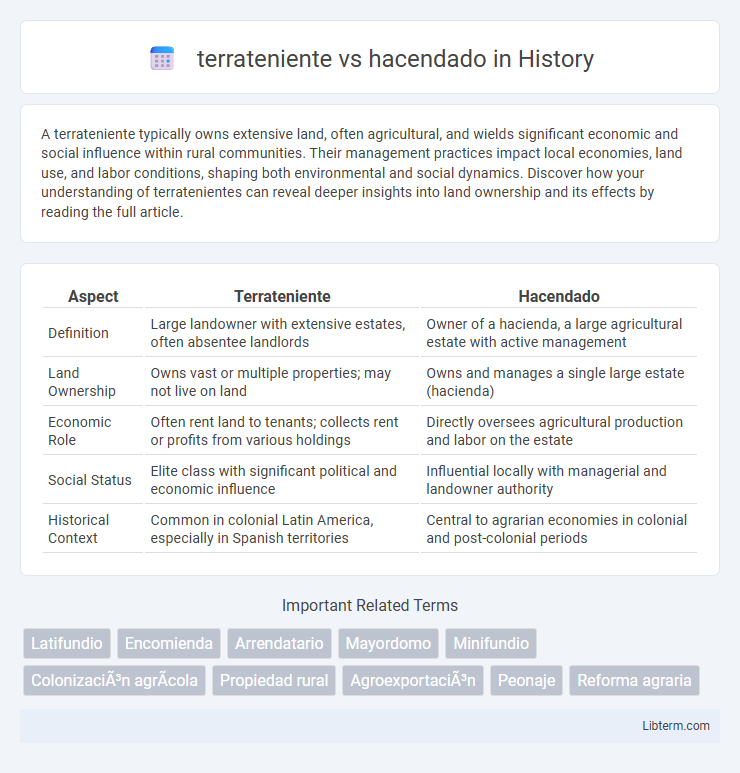A terrateniente typically owns extensive land, often agricultural, and wields significant economic and social influence within rural communities. Their management practices impact local economies, land use, and labor conditions, shaping both environmental and social dynamics. Discover how your understanding of terratenientes can reveal deeper insights into land ownership and its effects by reading the full article.
Table of Comparison
| Aspect | Terrateniente | Hacendado |
|---|---|---|
| Definition | Large landowner with extensive estates, often absentee landlords | Owner of a hacienda, a large agricultural estate with active management |
| Land Ownership | Owns vast or multiple properties; may not live on land | Owns and manages a single large estate (hacienda) |
| Economic Role | Often rent land to tenants; collects rent or profits from various holdings | Directly oversees agricultural production and labor on the estate |
| Social Status | Elite class with significant political and economic influence | Influential locally with managerial and landowner authority |
| Historical Context | Common in colonial Latin America, especially in Spanish territories | Central to agrarian economies in colonial and post-colonial periods |
Definición de terrateniente
A terrateniente is an individual who owns extensive land, typically used for agricultural purposes, and holds significant economic power within rural areas. Unlike a hacendado, who specifically manages a hacienda or large estate, the terrateniente's landholdings may vary in size and use, but the defining factor is their status as large landowners. This role often influences local social and political dynamics due to their control over land resources.
Definición de hacendado
A hacendado is a large landowner who manages and operates a hacienda, a vast estate typically dedicated to agriculture or livestock in Latin America. This role involves direct oversight of production activities and often includes employing laborers to work the land. While a terrateniente broadly refers to any landowner, a hacendado specifically connotes hands-on management and economic control over a sizable rural estate.
Origen histórico de ambos términos
The term "terrateniente" originates from Spanish colonial times, referring to large landowners who controlled extensive rural estates primarily for agricultural production and resource extraction. "Hacendado" evolved from the management of haciendas, which were colonial estates that combined agricultural, livestock, and sometimes industrial activities, often involving a more complex social and economic structure. Both terms reflect the historical land tenure systems in Latin America but highlight different aspects of land ownership and estate management rooted in Iberian colonization.
Diferencias clave entre terrateniente y hacendado
Terratenientes poseen grandes extensiones de tierra, muchas veces no cultivadas directamente, mientras que los hacendados administran fincas agricolas productivas y suelen involucrarse activamente en la produccion agricola o ganadera. Los terratenientes se caracterizan por ejercer control economico y politico desde la propiedad territorial, en cambio, los hacendados manejan operaciones agricolas especificas, enfocandose en la produccion y gestion diaria de la hacienda. La diferencia clave radica en la funcion: el terrateniente es propietario de tierras, el hacendado es empresario agricola.
Papel económico en la sociedad
Terratenientes hold extensive land ownership, often leasing large estates to hacendados who manage agricultural production and labor. Hacendados play a critical role in local economies by overseeing plantations and generating goods for both domestic consumption and export. This dynamic shapes rural wealth distribution and influences the socioeconomic hierarchy within agrarian societies.
Influencia política y social
Terratenientes ejercen una influencia politica significativa al controlar grandes extensiones de tierra, lo que les permite acceder a cargos publicos y alianzas con elites gubernamentales, consolidando el poder local y nacional. Los hacendados, propietarios de haciendas agricolas o ganaderas, tambien moldean estructuras sociales mediante la administracion de fuerzas laborales y la preservacion de tradiciones rurales, reforzando jerarquias sociales en comunidades especificas. Ambas figuras actuan como pilares de la oligarquia rural, impactando en politicas agrarias y en la distribucion de recursos dentro de sus regiones.
Propiedad de tierras y extensión
Terrateniente refers to a large landowner who possesses extensive properties often spanning thousands of hectares, typically with diverse agricultural or commercial uses. Hacendado is a specific type of terrateniente primarily associated with managing haciendas, large estates focused on agricultural production like cattle ranching or crop cultivation, usually covering several hundred to a few thousand hectares. The key difference lies in the hacendado's active role in estate management and production, while terratenientes may hold land as passive investors or for varied economic activities.
Producción agrícola y gestión de haciendas
Terratenientes typically manage extensive landholdings with diversified agricultural production, emphasizing large-scale crop cultivation and resource allocation across multiple haciendas. Hacendados often focus on the intensive management and operational efficiency of individual haciendas, optimizing labor, irrigation, and crop cycles to maximize yield. Both roles require strategic planning in agricultural production, but terratenientes prioritize land ownership and overall estate management, while hacendados concentrate on hands-on management of day-to-day farming activities.
Relevancia actual de los términos
The terms "terrateniente" and "hacendado" remain relevant in contemporary discussions about land ownership and agrarian structures in Latin America, often highlighting socio-economic disparities rooted in historical land distribution. "Terrateniente" typically refers to large landowners with significant political and economic influence, while "hacendado" denotes owners of haciendas, expansive estates that function as centers of agricultural production. Understanding these distinctions is essential for analyzing current land reform debates and rural development policies in countries with colonial legacies.
Impacto en la historia agraria
Terratenientes, large landowners often holding vast estates for speculative or rental purposes, shaped agrarian history by concentrating land control and limiting peasant access to productive land. Hacendados, as active estate managers and agricultural producers on haciendas, directly influenced rural economies, labor relations, and local agrarian productivity. The tension between terratenientes' landholding patterns and hacendados' operational roles contributed to land reform movements and social conflicts in Latin America's agrarian history.
terrateniente Infographic

 libterm.com
libterm.com